Over 30 years of anarchist writing from Ireland listed under hundreds of topics
Solidarity Times leaflet for August 29th Water Charges march
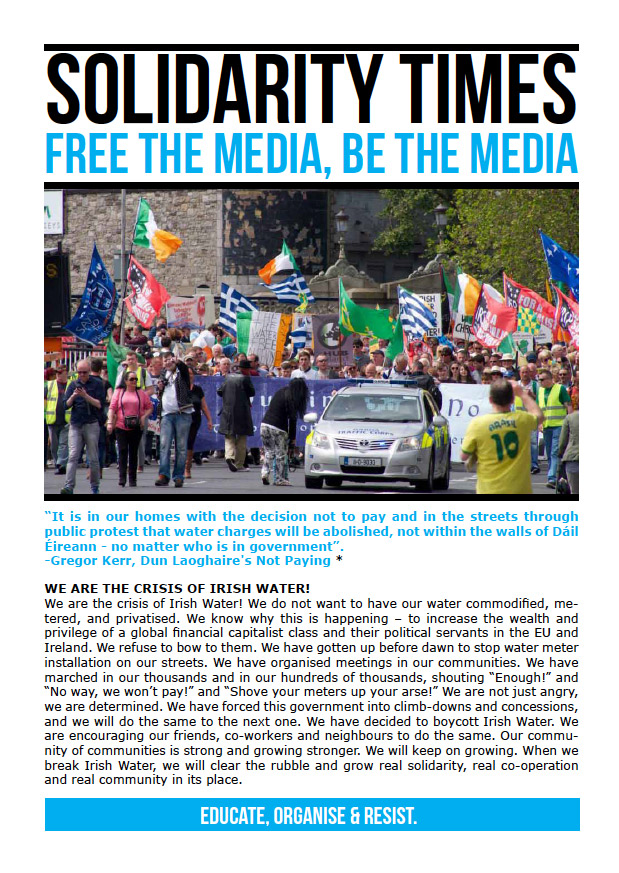 We are the crisis of Irish Water! We do not want to have our water commodified, metered, and privatised. We know why this is happening – to increase the wealth and privilege of a global financial capitalist class and their political servants in the EU and Ireland.
We are the crisis of Irish Water! We do not want to have our water commodified, metered, and privatised. We know why this is happening – to increase the wealth and privilege of a global financial capitalist class and their political servants in the EU and Ireland.
We refuse to bow to them. We have gotten up before dawn to stop water meter installation on our streets. We have organised meetings in our communities. We have marched in our thousands and in our hundreds of thousands, shouting “Enough!” and “No way, we won’t pay!” and “Shove your meters up your arse!” We are not just angry, we are determined.
We have forced this government into climb-downs and concessions, and we will do the same to the next one. We have decided to boycott Irish Water. We are encouraging our friends, co-workers and neighbours to do the same. Our community of communities is strong and growing stronger. We will keep on growing. When we break Irish Water, we will clear the rubble and grow real solidarity, real co-operation and real community in its place.
Divorce .. Undermining the family? ( WSM pamphlet from 1st Divorce Referendum in 1986)
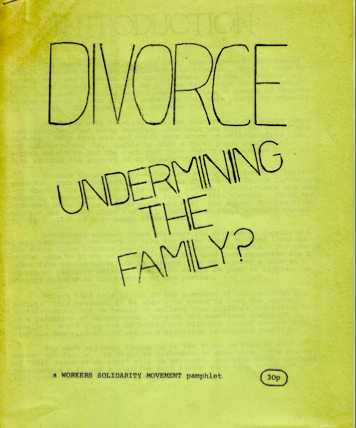 This pamphlet was produced by the Workers Solidarity Movement in the weeks before the 1986 referendum on whether or not to remove the constitutional ban on divorce. The vote was lost by a margin of almost 2:1, with 935,843 (63.48%) voting to keep the ban and 538,279 (36.52%) to remove it. A second referendum in 1995 saw the ban finally scrapped, with a result of 818,842 (50.28%) to 809,728 (49.72%).
This pamphlet was produced by the Workers Solidarity Movement in the weeks before the 1986 referendum on whether or not to remove the constitutional ban on divorce. The vote was lost by a margin of almost 2:1, with 935,843 (63.48%) voting to keep the ban and 538,279 (36.52%) to remove it. A second referendum in 1995 saw the ban finally scrapped, with a result of 818,842 (50.28%) to 809,728 (49.72%).
Alone on the far left, the WSM was heavily involved in this campaign and had two members elected to the National Executive of the Divorce Action Group. At the time they described their motivation as being to “increase personal freedoms” and “challenge the power of the Catholic bishops”. Read the full text of the pamphlet in the article.
Defeating the water charges - Don’t be fooled by the concessions - 4 page PDF paper
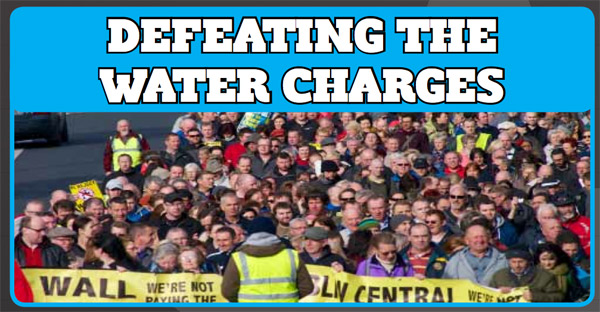
In the face of massive opposition to the water charges, the government have made several clumsy attempts to placate us, while their partners in the media seek to frighten us off the streets. The latest attempt, delivered by Alan Kelly, Minister for the Environment, Community & Local Government in the Dáil on the 19th of November, is the plan to charge us €160 per year for our water and to give ‘eligible households’ a water conservation grant of €100.
Take Back The Power! - Our message to ICTU's anti-debt marches 9th Feb '13
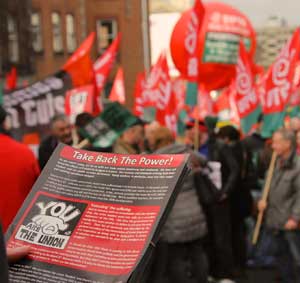 It is time for every one of us to take responsibility for trying to turn things around. We have to stop referring to ‘the union’ as something outside of ourselves and begin to see that our unions are OURS. We have to stop seeing ‘head office’ and ‘the officials’ as anything other than employees of the union - our employees who should be taking their instruction from us. And we have to convince our fellow-workers that there is a benefit to engaging with the union structures and organising to resist.
It is time for every one of us to take responsibility for trying to turn things around. We have to stop referring to ‘the union’ as something outside of ourselves and begin to see that our unions are OURS. We have to stop seeing ‘head office’ and ‘the officials’ as anything other than employees of the union - our employees who should be taking their instruction from us. And we have to convince our fellow-workers that there is a benefit to engaging with the union structures and organising to resist.
Shell to Sea release detailed report revealing Garda Ombudsman spin & misinformation
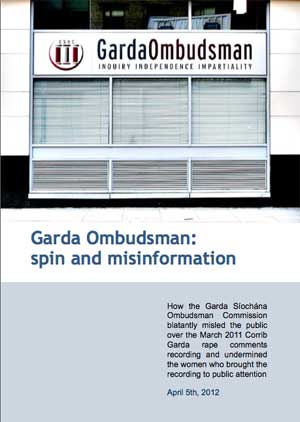 Shell to Sea have released a very detailed report into the GSOC 'investigation' of the Garda at the center of the 'Corrib Cops Rape Tape' which first came to public attention one year ago today. The report reveals that the Garda Síochána Ombudsman Commission (GSOC) engaged in spin and misinformation that misled the public over the Corrib ‘rape’ recording incident of March 2011 and undermined the case against Gardaí. The report details GSOC’s attempts to serve the interests of An Garda Síochána by undermining the women who made the recording public, while deflecting attention from the behaviour of Gardaí. The document was prepared by Shell to Sea with one of the women about whom the ‘rape’ comments were made and seven academics at NUI Maynooth. It has been made available online as a PDF and we are republishing it here.
Shell to Sea have released a very detailed report into the GSOC 'investigation' of the Garda at the center of the 'Corrib Cops Rape Tape' which first came to public attention one year ago today. The report reveals that the Garda Síochána Ombudsman Commission (GSOC) engaged in spin and misinformation that misled the public over the Corrib ‘rape’ recording incident of March 2011 and undermined the case against Gardaí. The report details GSOC’s attempts to serve the interests of An Garda Síochána by undermining the women who made the recording public, while deflecting attention from the behaviour of Gardaí. The document was prepared by Shell to Sea with one of the women about whom the ‘rape’ comments were made and seven academics at NUI Maynooth. It has been made available online as a PDF and we are republishing it here.
Parliament or democracy
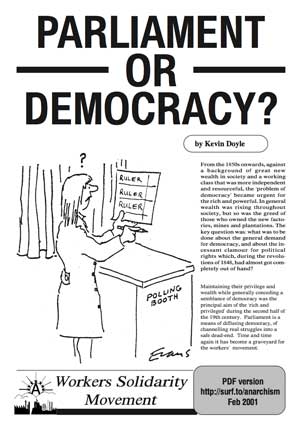 From the 1850s onwards, against a background of great new wealth in society and a working class that was more independent and resourceful, the 'problem of democracy' became urgent for the rich and powerful. In general wealth was rising throughout society, but so was the greed of those who owned the new factories, mines and plantations. The key question was: what was to be done about the general demand for democracy, and about the incessant clamour for political rights which, during the revolutions of 1848, had almost got completely out of hand?
From the 1850s onwards, against a background of great new wealth in society and a working class that was more independent and resourceful, the 'problem of democracy' became urgent for the rich and powerful. In general wealth was rising throughout society, but so was the greed of those who owned the new factories, mines and plantations. The key question was: what was to be done about the general demand for democracy, and about the incessant clamour for political rights which, during the revolutions of 1848, had almost got completely out of hand?
The Anarchist Origins of Mayday
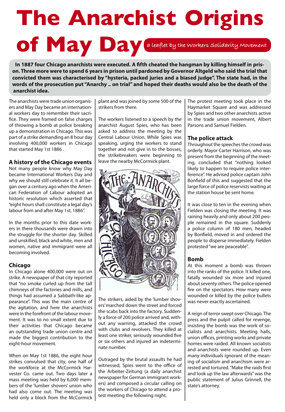 In 1887 four Chicago anarchists were executed. A fifth cheated the hangman by killing himself in prison. Three more were to spend 6 years in prison until pardoned by Governor Altgeld who said the trial that convicted them was characterised by "hysteria, packed juries and a biased judge". The state had, in the words of the prosecution put "Anarchy .. on trial" and hoped their deaths would also be the death of the anarchist idea.
In 1887 four Chicago anarchists were executed. A fifth cheated the hangman by killing himself in prison. Three more were to spend 6 years in prison until pardoned by Governor Altgeld who said the trial that convicted them was characterised by "hysteria, packed juries and a biased judge". The state had, in the words of the prosecution put "Anarchy .. on trial" and hoped their deaths would also be the death of the anarchist idea.
The 420 Billion giveaway: How Ireland is losing its valuable natural resources
This page 'rescues' the text of the Shell to Sea information pack 'The 420 Billion giveaway: How Ireland is losing its valuable natural resources' on Ireland’s offshore oil and gas and the Corrib Gas controversy, prepared by Dublin Shell to Sea November 2009.
Towards a Cure - WSM Health Pamphlet
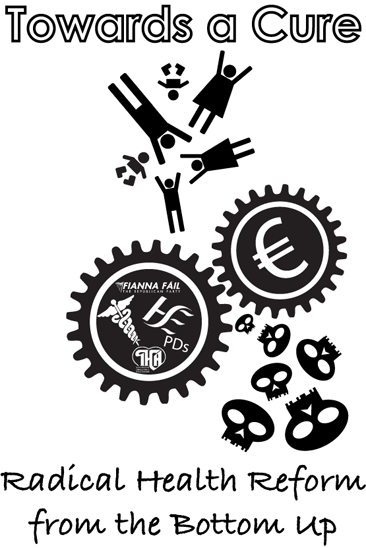 Radical health reform, in terms of creating equality and accessibility, and stopping the agenda of privatisation and for-profit medicine, is one of the great challenges facing Irish society.
Radical health reform, in terms of creating equality and accessibility, and stopping the agenda of privatisation and for-profit medicine, is one of the great challenges facing Irish society.
In this pamphlet, anarchists explain the reasons why such change is needed, give examples of important first steps in creating change, and describe the type of struggle that is necessary if we are going to win.
Communism: What's In A Word?
This article opens by looking at how the meaning of communism as opposed to socialism evolved in the late nineteenth century and closes with a look at how this applies to the free software movement today. The terms socialism and communism appear in England around the 1820s as terms adopted by members of the cooperative movement who were sick of hearing their politics referred to as "Owenism". Originally the two terms were undifferentiated but by the 1840s communism was used by revolutionaries to differentiate themselves from reformists such as J.S.Mill who had adopted socialism to cover an indigestible mess of reformisms.

